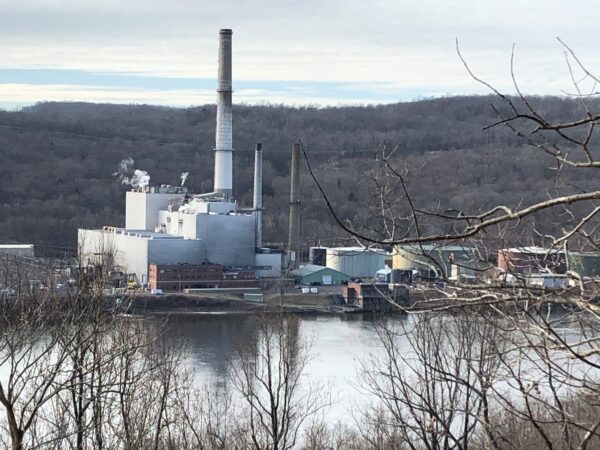
NRG power plant in Middletown as seen from the Air Line Trail in Portland. Photo by John Hall.
Middletown’s Common Council held a public workshop on the NRG plant on Thursday, February 11, on WebEx. Citizens joined the meeting in large numbers, most speaking in strong opposition to the proposed new 375 megawatt combustion turbine generator at the NRG Middletown power plant at 1866 River Road. We wish to thank everyone who attended and spoke. It made a big difference!
The recording of the presentations, public comment, and Common Council members questions can be viewed here.
The new turbine would replace 2 old turbines which, due to their inefficiency, outdated technology, and high emissions per megawatt hour of electricity produced, are permitted to run only a few days per year during time of peak demand. (Peak demand occurs mainly in summer during heatwaves.) Because of the new turbine’s greater efficiency, NRG requested an emissions permit that would allow it to run many more hours in the year, resulting in higher total emissions of CO2, Nitrogen Oxides (NOx), Sulphur dioxide (SO2), and soot (particulate matter).
Many Common Council members appeared to sympathize with our position that this proposal by NRG would be a setback for action to address climate change, and that it would increase total pollution due to the longer projected run time.
We hope that the Common Council will consider a resolution at an upcoming meeting to terminate the tax agreement with NRG that supports the project financially. We will keep our newsletter recipients informed about this matter.
The facts below were gathered from the DEEP Air Quality Bureau, the federal Energy Information Administration; the Independent Systems Operator of New England (ISO-NE); DEEP’s Integrated Resource Plan (which describes the pathway to reach the State’s climate goals); and documents obtained from the City of Middletown through the Freedom of Information Act.
- Middletown already hosts far more than its share of electricity generators (approximately 1500 megawatts of the statewide 6937 megawatt capacity), and Connecticut already generates 26% more electricity per year than it consumes, with the net excess generation exported to nearby states.
- The proposed 375 megawatt single-cycle combustion generator turbine at the NRG plant located at 1866 River Road, according to emissions modeling by DEEP’s Air Quality Bureau, will result in a 6.2-fold increase in carbon dioxide (CO2) emissions (from 170,000 tons to 1,056,505 tons per year). Due to the longer anticipated run-time, the turbine will also produce an 8-fold increase in emissions of particulate matter (PM) (from 11 tons to 87 tons per year), and continued substantial emissions of nitrogen oxides (NOx) (125 tons per year). NOx is a precursor to ozone, for which our location is in non-compliance.
- Emissions of PM, SO2, and NOx are damaging to respiratory health and constitute an additional burden on communities with already elevated exposure to PM, such as lower- income communities and those that have suffered historic racial discrimination in employment, housing, and medical services.
- A project that will increase emissions of CO2 for electricity generation is in direct conflict with the State of Connecticut’s statutory greenhouse gas emissions reduction goal of 45% by 2030 and 80% by 2050, the Governor’s Zero Carbon Target of decarbonizing the electricity generation system 100% by 2040. The project is similarly in conflict with the President’s goal to eliminate carbon from the grid by 2035 and with the City of Middletown’s Climate Emergency Declaration passed in September 2020.
- The proposed combustion generator would utilize primarily natural gas, of which over 50% is collected by hydro-fracking, a percentage that is rising. Hydro-fracking and the construction of natural gas pipelines result in severe environmental damage, including leakage of methane, a greenhouse gas 84-fold more potent than CO2.
- The City of Middletown entered into a tax agreement with NRG in 2019, specifying the annual taxes to be paid after the operation of the new turbine commences. This agreement is favorable to NRG, compared to what the taxes would be according to the current mill rate multiplied by the assessed value of the new turbine (70% of $280 million, or $196 million, followed by reasonable depreciation) that was cited in support of the project at the Common Council meeting on June 3, 2019.
- The City has the option to terminate the tax agreement if the new turbine does not clear the Forward Capacity Auction (FCA) in February 2021. The Forward Capacity Auction is the process through which generation companies obtain payments for obligations to generate power in a certain year, ensuring sufficient capacity to meet demand.
The Jonah Center urges Middletown’s Mayor and Common Council to express strong opposition to the proposed NRG turbine project, to terminate the tax agreement with NRG if the proposed turbine fails to clear the FCA in February 2021, and to invite NRG into dialog with the City to develop a beneficial project at 1866 River Road, such as an energy-storage facility to meet peak demand, that is consistent with and supportive of City, State and national climate goals.
At this time, residents should express their views on this matter to:
Middletown’s Mayor Ben Florsheim at Mayor@MiddletownCT.gov and the Common Council at Council@MiddletownCT.gov .
Further actions would include contacting Governor Lamont at governor.lamont@ct.gov and the CT Siting Council at siting.council@ct.gov













